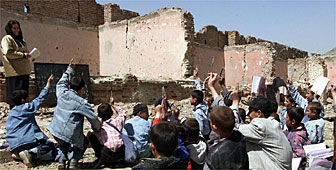Swiss priority in Afghanistan shifts to rebuilding

Although Swiss aid to Afghanistan in the short term will focus on humanitarian needs, the new priority is to help rebuild the war-torn country.
But it could take 20 years until the real benefits of the development programs take effect.
Those are the conclusions of Willy Lenherr, head of the Asia division at the Swiss Agency for Development and Cooperation (SDC).
Lenherr told swissinfo that the immediate emphasis must be on helping the people of Afghanistan to get back on their feet as soon as possible. The SDC’s goal is to maintain current levels of aid but to shift the emphasis gradually to development programmes.
“Ideally this would mean a reduction in the necessity for humanitarian aid, so that the SDC could concentrate its efforts on helping rebuild the country’s infrastructure, improving the healthcare system and supporting social projects.”
Switzerland’s pledge
The SDC is responsible for the overall coordination of development activities and humanitarian aid, and this year it’s channelling SFr21 million of Swiss aid to Afghanistan.
Switzerland pledged SFr20 million after the international donor conference in Tokyo in January. Foreign Minister Joseph Deiss promised an additional SFr1 million during a one-day visit to the Afghan capital, Kabul, on Wednesday.
The largest chunk of that money, SFr15 million, has been earmarked for humanitarian purposes. Out of that, SFr10 million is being used to support United Nation’s relief efforts such as the World Food Programme.
“Internally displaced people and refugees are our priority at the moment,” says Lenherr. “If they go back now and start working on their fields, they will have the chance to produce food for the next year.
“If they don’t, then they will be without food for another year.”
Lenherr estimates that there are currently seven million refugees or displaced people.
Apart from supporting a number of agricultural projects to ensure that Afghanistan will be able to feed itself, Lenherr also says there need to be economic, social and political stability within the country to enable development programmes to be implemented.
Development programmes
The SDC has allocated SFr5 million this year to support development projects in Afghanistan. It currently has 10 experts who are attached to UN agencies in the country. They advise on a number of projects including the construction of roads, building bridges, water sanitation and communications between military and civil groups.
In the north of Afghanistan, in an area formerly controlled by the Northern Alliance, the SDC has been co-financing public healthcare programmes.
It has been supporting Swiss non-governmental organisations (NGOs) in their efforts to establish a basic healthcare system.
Lenherr says the health service has virtually collapsed over the last six months. But at the same time there has been a drive by the NGOs to improve the medical services provided, especially at the level of primary healthcare.
“It has also been important to pay health workers in the field,” so that the services can continue in the absence of a national healthcare system.
“You have to imagine a country with a population of 22 million which has no health structure from the top, and no health programmes.”
Women and children
Even before the September 11 attacks, the SDC had been supporting programmes to empower women. The “peace programme” is run at the village level and helps the local population produce food.
Lenherr says a lot of women participate in these projects and it has taken on an important role in helping them participate in the reconstruction of society.
During the last few months of the Taliban regime it was increasingly difficult to continue with schemes such as the all-female bakery in Kabul, where women bake and distribute bread. “But in recent months,” says Lenherr “it is back in full swing again.”
The Interim Authority in Afghanistan has given a high priority to children’s education, and the international community has pumped a lot of money into paying teachers and providing educational material.
History of involvement
The SDC has been active in Afghanistan for 20 years and benefits from having a permanent presence in the capital, Kabul.
Switzerland responded to emergencies in Afghanistan, such as the series of earthquakes at the end of March, much more quickly than many other countries, because it already had a number of staff on the ground.
“This is our special field,” says Lenherr. “We try to react immediately and since we have a certain network and a coordination office we were able to send people immediately and provide food and medical aid.”
The SDC’s plans depend on political developments over the rest of this year and how successful they are in encouraging people to return to their homes.
“The optimistic scenario,” he says “would be to see a slight reduction in humanitarian aid and an increase in the development side.
“We have no illusions about how long it will take for development programmes to become established, and we will continue to support projects to improve the infrastructure and society as a whole.”
by Jonathan Summerton

In compliance with the JTI standards
More: SWI swissinfo.ch certified by the Journalism Trust Initiative
You can find an overview of ongoing debates with our journalists here . Please join us!
If you want to start a conversation about a topic raised in this article or want to report factual errors, email us at english@swissinfo.ch.